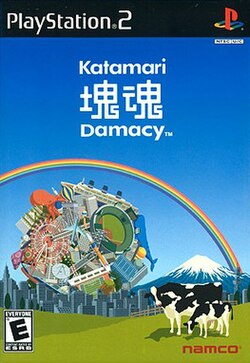King of All Cosmos
| Katamari Damacy | |
|---|---|

North American box art
|
|
| Developer(s) | Namco |
| Publisher(s) | Namco |
| Director(s) | Keita Takahashi |
| Producer(s) | Hideki Tomida Mitsumasa Fujita |
| Designer(s) | Masatoshi Ogita |
| Programmer(s) | Kazumi Yamabe |
| Artist(s) | Keita Takahashi Takashi Yoshida Moe Miura |
| Composer(s) |
Yuu Miyake Asuka Sakai Akitaka Tohyama Hideki Tobeta Yoshihito Yano Yuri Misumi |
| Series | Katamari |
| Platform(s) | PlayStation 2 |
| Release | |
| Genre(s) | Puzzle, action |
| Mode(s) | Single-player, multiplayer |
| Aggregate scores | |
|---|---|
| Aggregator | Score |
| GameRankings | 85.73% |
| Metacritic | 86/100 |
| Review scores | |
| Publication | Score |
| 1UP.com | A |
| Edge | 8/10 |
| Eurogamer | 9/10 |
| Famitsu | 31/40 |
| Game Informer | 8/10 |
| GamePro | |
| Game Revolution | A− |
| GameSpot | 8.7/10 |
| GameSpy | |
| GameZone | 9.2/10 |
| IGN | 9/10 |
| OPM (US) | |
Katamari Damacy (塊魂? Katamari Damashii, lit. "clump soul") is a third-person puzzle-action video game developed and published by Namco for the PlayStation 2. It was first released in Japan and then later in North America. The game resulted from a school project from the Namco Digital Hollywood Game Laboratory and was developed for less than $1 million. In designing Katamari Damacy, the development team aimed to maintain three key points: novelty, ease of understanding, and enjoyment.
The game's plot concerns a diminutive prince on a mission to rebuild the stars, constellations, and Moon, which were accidentally destroyed by his father, the King of All Cosmos. This is achieved by rolling a magical, highly adhesive ball called a katamari around various locations, collecting increasingly larger objects, ranging from thumbtacks to people to mountains until the ball has grown great enough to become a star. Katamari Damacy's story, characters, and settings are bizarre and heavily stylized, rarely attempting any semblance of realism, though the brands and items used are based on those current in Japan during the game's production.
Overall, Katamari Damacy was well received in Japan and North America. The game was dubbed a sleeper hit and won several awards. Katamari Damacy inspired the development of other video games, and led to the release of eight sequels in Japan and other territories: We Love Katamari (PlayStation 2), Me & My Katamari (PlayStation Portable), Beautiful Katamari (Xbox 360), i Love Katamari (iOS, Windows Phone 7, Android), Katamari Forever (PlayStation 3), Katamari Amore (iOS), Touch My Katamari (PlayStation Vita), and Tap My Katamari (iOS, Android).
...
Wikipedia
